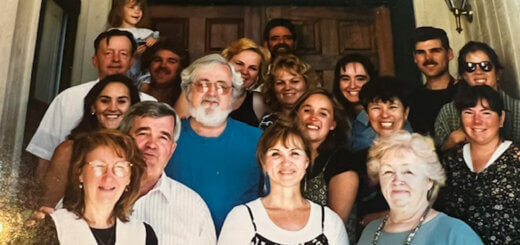Filmmaker rewrites his own ending while educating others
Darren Colston of Oakland made a short film about his grandfather who died with dementia in 2013. Dissatisfied with the way his personal story ended, Darren rewrote it for his film. He hopes his film will help others in their journey and remind them that time is short and it’s important to spend time with your loved ones.
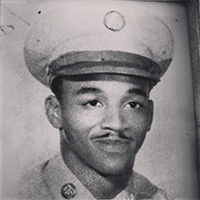
A military man, a baseball player and a postman
“I always wanted to make a movie about my grandpa’s life,” said Darren. Howard Colston Sr. and a few of his siblings grew up in an orphanage after their mother died and their father gave them up. Howard ran away, lied about his age and joined the military, serving in the U.S. Navy, U.S. Army and eventually the Army Aircorp.
Most notably, Howard was recognized for his skill as a baseball player. Recruited by the then Kansas City Athletics (which would become the Oakland A’s), he turned them down in order to stay in the military until he retired. While he served, he played for the military’s baseball league.
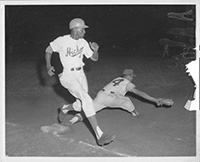
“He served during both World War II and Korea,” said Darren. “But was stationed in Hawaii because of baseball.”
After his time in the military he moved on to work as a postman in Davis, CA. “He was beloved by the community,” said Darren. “Over 600 people from his route were in attendance at his retirement.
“His retirement was televised on a public station so elders that couldn’t make it to his retirement could watch. They made his retirement a holiday, at least for that year, and dedicated a bench to him.”
Challenging gender norms
When Darren was a child, Howard lived in California and Darren was in Washington. Some summers Howard would travel to Washington to pick up Darren so they could go fishing in Canada. Other summers Darren would go to Sacramento to visit his grandparents.
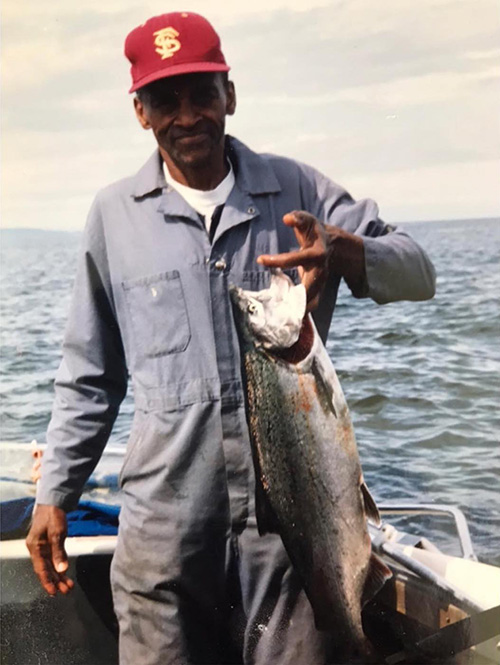
“He was a sweet man who really shaped how I view being a man,” shared Darren. “He cooked and gardened. He was also an outdoorsman and a fisherman. I think the cooking and gardening left an impression on me.
“He was sweet but still a man’s man. Doing the things that were outside of gender norms made an impression on our family and the way we function.”
Focusing on his career
In 2013, Darren was a busy man working on his film career. Howard had nearly drowned while fishing a few years prior and now had dementia, related to hypoxia. Darren had been too busy to visit his grandfather, not realizing how bad the dementia had become.
When the phone call came from Darren’s father that Howard wasn’t doing well, Darren made one final visit to his grandfather, who was now living in Canada.
Tension between residents
On this final visit to see his grandfather, there was an incident with another resident at the facility. “Another resident tried to barge into the room,” recalled Darren. “He was having a hard time and wanted us to get out of his house.
The resident was most notably upset that Darren and his family were black and used a derogatory term to express this. “He was really pushing and starting to get a little violent,” said Darren. “I was trying to get him back out without putting my hands on him and my grandpa got up and pushed me out of the way.
“My grandpa said to the man, “˜This isn’t right! You’re only saying this because of the color of our skin.’ My grandpa stood up for us, even though he couldn’t remember who we were.”
They were able to get the resident out of the room without further incident. Darren spent the rest of the day with his grandfather, who, at the end of the day, still did not remember him. Howard died a few months later.
It was this story of standing up for people, no matter who they were, that inspired Darren to make his film, Grandpa’s Hands. He wanted to honor his grandfather’s memory while also reminding people that time with your loved one is precious, and not to waste it.
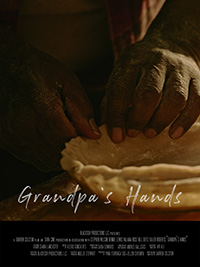
Rewriting his ending
Darren was sad that his grandfather hadn’t recognized him during their final visit. “It’s something I would have like to have had happen,” shares Darren. “I was busy, unavailable and didn’t understand how bad it was. I wish I had visited him more when I had the chance.”
As Alzheimer’s disease progresses, memory loss often becomes more severe. A person may not recognize family members, may forget relationships, call family members by other names, or become confused about the location of home or the passage of time. These changes can be some of the most painful for caregivers and families.
Darren’s short rewrites his history by giving him the ending he wanted but didn’t get. “The short is about distraction and what gets in the way of us being present with our family,” said Darren. “In the end there is a moment when they recognize each other. I wish I’d had that moment, but I didn’t.”
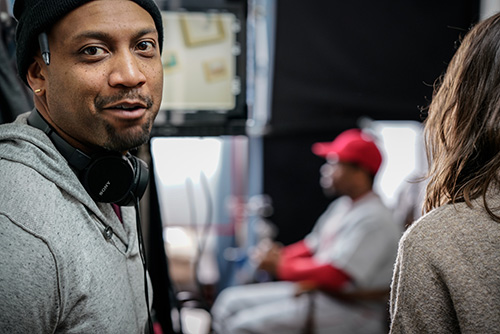
Using the film to raise awareness
In addition to recreating his own personal ending, Darren wants to use his film to raise awareness. “Personally, whenever I hear Alzheimer’s or dementia, the first image that pops into my head is an old white lady,” says Darren. “I wondered if that’s something the media had created, and I thought it was something I should address.”
“I want people in my community to think about what Alzheimer’s and caretaking entails. I feel like maybe we’re not aware how impactful it is on our lives, specifically, men.
“I’m speaking to my own demographic. Women in the community are typically the caretakers, taking care of kids and elders and not taking care of themselves. Men in the community have the ability to step it up.
“I hoping my film brings up this issue. I also want the film to address how distracted we are and how we can become more engaged.”
Making a difference for himself and others
While making this film, Darren learned about Alzheimer’s and some things he could start doing to possibly reduce his risk. “It made me rethink my health and the way I take care of myself,” said Darren. “I eat better and exercise.”
Darren is also excited to use this film as a tool to help others change their lives. “Typically, short films are resume builders for filmmakers,” says Darren. “They don’t have much life beyond self-promotion. I’m excited that this film can be used as a tool to help others, and maybe touch some lives.”
At this time, Darren isn’t sharing his video publicly, as it is currently submitted to multiple film festivals. However, you can see Darren’s film at this year’s African American Forum on April 18, 2020. You can sign up for the Forum at tinyurl.com/AfAmAlz2020
Learn more:







